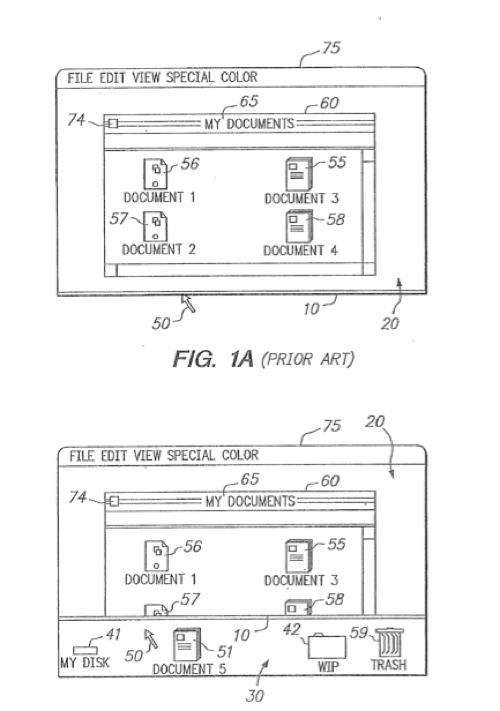The late Steve Jobs’ name is listed as an inventor on a new patent at the U.S. Patent & Trademark Office. Patent number 20120023434 regards an user interface for providing consolidation and access.
Methods and systems for providing graphical user interfaces are described. To provide greater access and consolidation to frequently used items in the graphical user interface, a user bar is established which includes a plurality of item representations.
To permit a greater number of items to reside in the user bar, a magnification function can be provided which magnifies items within the user bar when they are proximate the cursor associated with the graphical user interface. The inventors are Bas Ording, Steven P. Jobs and Donald J. Lindsay.
Here’s Apple’s summary of the invention: “According to exemplary embodiments of the present invention, these and other drawbacks and difficulties of conventional GUIs are overcome by providing a simple, consolidated and easily extensible facility for handling, for example, frequently used objects. For example, user interfaces according to the present invention provide a tool (referred to herein as the ‘user bar,) which consolidates features including: launching and managing running applications; opening and managing documents and their associated windows; accessing control strip functionality; navigation to all types of uniform resource locators (URLs); and status and notification on running processes.
“As mentioned above, existing tools of this type, such as taskbars and docks, are constrained in one or more of at least two ways: having a rigidly structured layout and being limited in the number of objects that they can represent in the available screen space. With respect to layout, the userbar according to the present invention is designed so that the organization of the userbar is in the hands of the user. For example, the tiles that represent the individual items in the userbar can be reorganized at will. There is virtually no structure enforced on the user, with the exception of two ‘bookends’ which define boundaries of the facility.
“With respect to screen space, the userbar according to the present invention provides a method for scaling the entire contents of the object handling facility such that literally upwards of fifty objects (or more) can be accommodated in a single, visible structure. As the objects handled by the userbar become rather small, e.g., due to the size set by the user or due to a large number of objects being added thereto, it naturally becomes more difficult to distinguish between different tiles.
“Accordingly, exemplary embodiments of the present invention provide a magnification effect, also referred to herein as a fisheye effect, for browsing the scaled contents of the userbar. This mechanism allows specified contents of the userbar, in particular minimized windows, to be presented at a larger size and in greater detail and legibility than other objects in the userbar. This feature permits, among other things, the individual tiles of the tool to retain their legibility and prevents the user interaction with the tool from being compromised by the scaled contents.”
Also appearing today at the U.S. Patent & Trademark Office are:
° Six patents — numbers 20120023348, 20120023347, 20120023346, 20120023351, 20120023356 and 20120023365 — involving non-volatile memory.
° Patent number 20120023357 for cyclemaster synchronization in a distributed bridge: a method of synchronizing cyclemasters over a distributed bridge is disclosed.
° Patent number 20120023275 for increased speed of processing data received over a communications link: a method and apparatus for processing data samples utilizes a channel map populated by device descriptor, or by an application program interface.
° Patent number 201200231855 for accessory attachment protocol and responsive actions: embodiments of the present invention provide various communication techniques for communication between a mobile computing device and an accessory. An accessory protocol that is generic to the mobile computing device can be used for some communication.
° Patent number 20120023439 for methods, program products, and systems of chunking data records.
° Patent number 20120023506 for maintaining data states upon forced exit.
° Patent number 2012001196 for a smooth composite structure: certain embodiments disclosed herein relate to a smooth finish composite structure and methods for making the composite structure.
° Patent number 20120019494 for a method, system, and apparatus that can be used to operate a display device in an energy efficient manner.
° Patent number 2012003060is for an electronic device for predicting or anticipating a user’s operational desires.
° Patent number 20120019546 involves color correction of mirrored displays.

